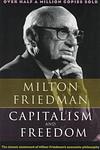Milton Friedman
Milton Friedman was an influential American economist and statistician known for his strong belief in free-market capitalism. He received the Nobel Memorial Prize in Economic Sciences in 1976 for his achievements in the fields of consumption analysis, monetary history and theory, and for his demonstration of the complexity of stabilization policy. As a leader of the Chicago School of Economics, he had a widespread impact on the research in the field of economics. Friedman was also known for his advocacy of economic policies that promoted personal freedom and was a prominent advisor to political leaders.
Books
This list of books are ONLY the books that have been ranked on the lists that are aggregated on this site. This is not a comprehensive list of all books by this author.
-
1. Capitalism and Freedom
This book explores the role of competitive capitalism - the organization of the bulk of economic activity through private enterprise operating in a free market - as both a device for achieving economic freedom and a necessary condition for political freedom. The author further examines how freedom could be preserved in a society where the roles and importance of government are ever expanding, and presents his view on topics such as monetary policy, fiscal policy, education, discrimination, and the alleviation of poverty.
-
2. Free to Choose: A Personal Statement
This book is an influential work promoting the principles of economic and political freedom. The authors argue that individual freedom is directly linked to economic freedom, and they advocate for less government intervention in the economy. They explore topics like inflation, education, and consumer protection, and propose free-market solutions. The authors also provide historical examples to support their arguments and warn against the dangers of socialism and excessive government control.
-
3. A Theory Of The Consumption Function
This book presents a groundbreaking study of the consumption patterns of individuals and households. The author challenges the traditional Keynesian consumption function which posits that individuals and households adjust their consumption spending in response to changes in income. Instead, the author proposes the "Permanent Income Hypothesis," asserting that consumers' spending habits are determined not by current income but by their longer-term income expectations. This influential theory has had a significant impact on economic policy and remains a cornerstone of macroeconomic theory.


